By C. Todd Lopez
SOTO CANO AIR BASE, Honduras (Oct. 01, 2009) -- Providing medical care to the Soldiers, Sailors, Airmen and Marines assigned to Soto Cano Air Base, Honduras, is one part of the mission of the Joint Task Force-Bravo Medical Element.
The JTF-B MEDEL also facilitates humanitarian operations that provide medical and dental care to host-nation civilians living in U.S. Southern Command's area of responsibility.
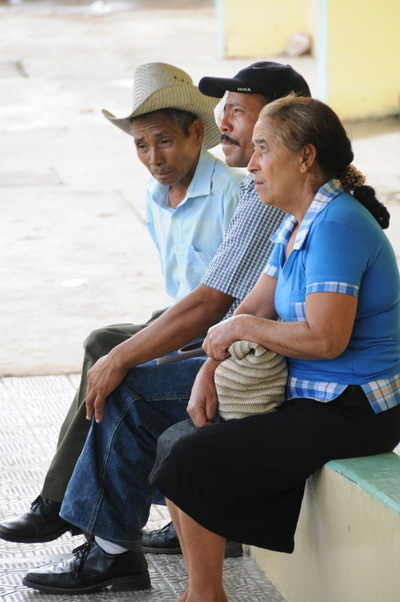
"We support JTF-B and USSOUTHCOM throughout their area of focus-the Caribbean and Latin America-usually through medical readiness training exercises or medical readiness exercises. We also support them in humanitarian assistance projects," said Dr. (Col.) Otto F.W. Boneta, director of the Medical Element at JTF-B.
The JTF-B MEDEL hosts rotations of military doctors, dentists, and other military medical personnel from the United States-many times from the National Guard or from stateside medical centers-on two-week medical readiness training exercises, or MEDRETEs. The MEDRETEs bring skilled military medical personnel who provide free dental care and medical assessment and treatment to the most rural areas of Honduras and other parts of Central and South America, including the Dominican Republic, Panama, Nicaragua, Colombia and Costa Rica.
"They come down here to get more experience conducting and executing medical operations. They also see medical cases that we don't normally see in the United States," Boneta said. "So it is very educational and beneficial for our doctors to come down here and see those things. It is beneficial for the local patients who might not ever get seen by a doctor."
Dr. (Lt. Col.) Joel Rossen, a pediatric nephrologist from San Antonio, specializes in treating kidney disease in children. He said the austere environment that military medical personnel experience in Honduras and other parts of Central and South America helps prepare them for deployments to Iraq and Afghanistan.
"This is part of the training mission for the residents to get them exposed to deployment," Rossen said. "We go out into the villages and there's a lot of hiking. We also set up a clinic, and that gives us practice for Iraq or Afghanistan."
Dr. (Capt.) Domenick Nardi, an Army pediatric resident out of Fort Sam Houston, Texas, said working in Honduras as part of a JTF-B-sponsored MEDRETE also helps prepare military medical personnel for military disaster-response operations.
"We are often called upon to do not only our military mission, but to help with humanitarian missions around the world, when actual disasters strike," Nardi said. "So I think being in the situation helps to prepare for that."
Nardi said while he was in Honduras, he learned how to work in a spartan environment, how to organize the delivery of medical care, and also how to work hand-in-hand with the Honduran government to deliver medi-cal care in remote locations.
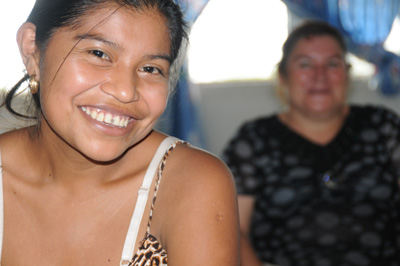
"In the areas around Marcala and La Paz, we hiked out into the mountains with guides on a daily basis. We went to rural areas with no indoor plumbing or running water-it was mud shacks made from handmade mud bricks," Nardi said. "We've learned how the medicine is delivered in that austere environment, and also to help the Honduran government bring medical care and better nutrition to their more poverty-stricken rural areas."
More than just routine medical and dental care, JTF-B also has a surgical team that provides vital treatments to impoverished civilians in Honduras. While the team can provide surgical care to JTF-B servicemembers if needed, their main focus is to help the locals, bringing the time, experience and equipment needed to provide surgical care.
"Their real mission is to provide host-nation support at the two local hospitals, two to three days a week," Boneta said. "We go there and do surgery and provide all of the medical supplies, expendables, and reusable stuff that we can sterilize and bring back here. And we work with the Honduran surgeons."
Boneta said some of the most common specialties requested by USSOUTHCOM partner nations include ophthalmology, orthopedics, urology and gynecology.
"There is a big needed for orthopedic surgery, especially for hand surgery," Boneta said. "There is a lot of machete use here and they get extensive machete injuries, so they are requiring medical reconstruction. Also (plastic surgery) is needed for cleft lip and palate, which is a disfiguring congenital problem. If we can fix that in a patient, it would be life-changing."
At the Hospital Roberto Suazo Cordova in La Paz, a city about seven miles from Soto Cano Air Base, Hondurans from the city, the mountain villages, and the surrounding farms line up for medical care outside the hospital doors, and wait on curbs or benches.
Unlike in the United States, the hospital at La Paz lacks the lingering smell of disinfectant. It's short on staff, equipment, medicine, supplies and adequate funding. What it's not short on are patients needing treatment.
Dr. (Lt. Col.) Shaun Price is one of the surgeons assigned to JTF-B who sees, first-hand, the challenges and benefits of the medical efforts in Honduras.
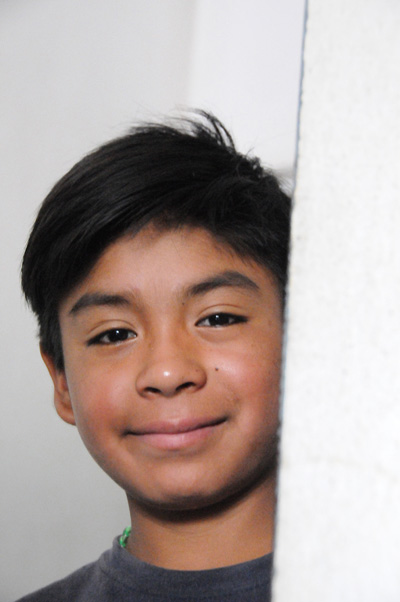
"So far this morning we've done two cholecystectomys, which is removal of the gall bladder," he said. "Typically, we do those procedures for gallstones, which can cause pain in the abdomen. Sometimes the gallbladder can get inflamed."
Price said in the United States, laparoscopic surgery is typically done to remove the gall bladder-that involves the insertion of equipment that allows the surgeon to work in a less invasive way. But the equipment is expensive and not available in Honduras, so the surgery there must be done in a more traditional, though equally effective way. For him, that means getting practice in a surgical technique he does not often do.
"From a personal standpoint, I am actually learning to perform open cholecystectomys through very, very tiny incisions that we don't typically utilize back in the United States," he said. "So I am gaining some technical expertise by being here."
Because equipment and supplies are severely limited, the surgical team from JTF-B brings many of its own supplies to the hospital. Price said the kinds of resources lacking in the Honduran hospital are those often taken for granted by surgeons in the United States.
"We practice in a somewhat austere environment by coming to these places," he said. "We become very fastidious in the use of our resources in these facilities. This is what we would probably encounter in a field environment, and a disaster relief kind of situation."
While the Honduran hospital is lacking in supplies, it's not lacking in experience. Price said that Honduran doctors are well-trained professionals, and that he learns from them as they learn from him. It's not a matter of skill, he said, it's a matter of money.
"Being here I have found that we are very fortunate in the United States and that a lot of the supplies that we as surgeons take for granted and consider disposable, the Hondurans don't have access to on a regular basis," Price said. "What we provide to them is not necessarily skill-because they are all very knowledgeable and skilled surgeons in their own right. What we do is provide supplies that the surgeons utilize during their cases."
Price said that his surgical team typically handles eight to 15 cases a week. Over time, he said, they'll probably manage almost 100 cases.
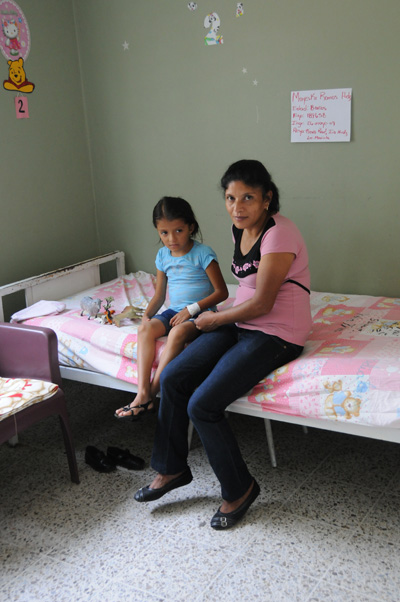
The head of surgery at the hospital, Dr. Blanca Dermith, is appreciative of both the supplies the JTF-B surgeons bring and the care they provide. As she is the only surgeon permanently assigned at the hospital, she is keenly aware of the value of the teams.
"The most important thing is that we can operate on very poor people who otherwise don't have an opportunity to undergo surgery," Dermith said. "And these Soldiers bring the surgical sets. And anything left at the end of the day I can use for my night shift."
Dermith also said the assistance of skilled surgeons from JTF-B means that her hospital can see more patients-and that means the wait time for patients is less.
"Patients come from everywhere," she said. "And patients like to come here because I can book up to six or eight cases a day. And appointments from the initial visit are not that far away."
Recently, Dermith said, the Honduran Ministry of Health recognized her hospital for its increased efficiency in providing surgical care to patients-in part, due to assistance from JTF-B surgical teams.
"We have a very high productivity rate for surgery, compared to other hospitals," she said. "The patients say let's go have surgery at La Paz, because they have no wait time."
Beyond medical, dental and surgical care, the JTF-B teams are also helping the Hondurans with preventative treatment including AIDS education and screening and nutritional surveys.
Working with the Honduran government, the teams assess the nutritional status and needs of both children and adults, as well as ways to address those deficiencies. One such effort involves distributing "sprinkles" to women of child-bearing age. The sprinkles are a package of micronutrients that can be added to food to help civilians better meet their nutritional needs.
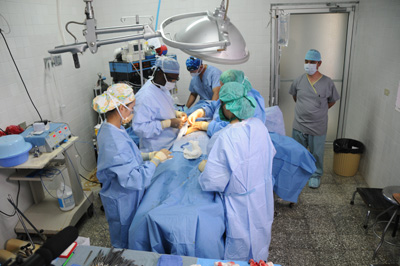
Dr. (Capt.) Rachael Dawson, who specializes in pediatrics, supported the ongoing nutritional study.
"We're part of the team that is studying the nutritional deficiencies and vitamin deficiencies of the children in certain areas," she said. "We're doing surveys and checking for anemia and giving medications as needed."
Dawson said the studies also involve looking for trends in birth defects that are linked to not having enough folic acid in the diet.
"Hopefully we can see a trend towards less birth defects if they are taking the sprinkles," she said.
Dr. Terri Kemmer, a former Army doctor, now works at South Dakota State University. She is one of the co-coordinators of the nutritional program, and said the program will provide important information to the Honduran government to help its population.
"The Ministry of Health uses the data to prioritize their use of limited resources," she said. "Additionally, the World Food Program and UNICEF can use the information to direct their programs in the country to the areas most in need. They will basically take the information and work within those regions to expand programs."
She said that in Honduras, their studies have found that many children are going without the nutrition they need, limiting their ability to grow.
"We are finding prevalence of (growth) stunting extremely high-anywhere from 50 to 80 percent of the population," she said.
In Honduras and other parts of Central and South America, the JTF-B medical teams gain valuable experience and prepare themselves for missions in Iraq and Afghanistan, while providing vital medical, dental and surgical care to local civilians .
"All of us are in medicine because we want to help people," Boneta said. "And being able to go out and help those people that need it-that is particularly rewarding. We want to be good neighbors. We want to help them prosper. We want to help them have a more secure environment. If they have a secure environment and they prosper, in the long run, it will be good for America too."